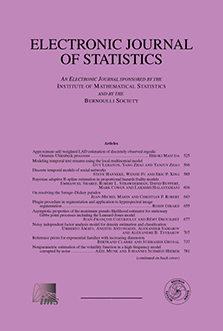Abstract
We consider a Gaussian sequence space model $X_{\lambda}=f_{\lambda}+\xi_{\lambda},$ where the noise variables $(\xi_{\lambda})_{\lambda}$ are independent, but with heterogeneous variances $(\sigma_{\lambda}^{2})_{\lambda}$. Our goal is to estimate the unknown signal vector $(f_{\lambda})$ by a model selection approach. We focus on the situation where the non-zero entries $f_{\lambda}$ are sparse. Then the heterogenous case is much more involved than the homogeneous model where $\sigma_{\lambda}^{2}=\sigma^{2}$ is constant. Indeed, we can no longer profit from symmetry inside the stochastic process that one needs to control. The problem and the penalty do not only depend on the number of coefficients that one selects, but also on their position. This appears also in the minimax bounds where the worst coefficients will go to the larger variances. With a careful and explicit choice of the penalty, however, we are able to select the correct coefficients and get a sharp non-asymptotic control of the risk of our procedure. Some finite sample results from simulations are provided.
Citation
Laurent Cavalier. Markus Reiß. "Sparse model selection under heterogeneous noise: Exact penalisation and data-driven thresholding." Electron. J. Statist. 8 (1) 432 - 455, 2014. https://doi.org/10.1214/14-EJS889
Information





